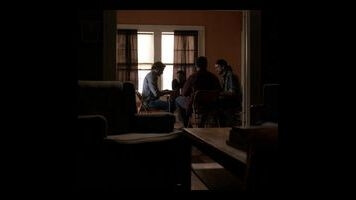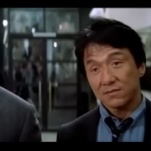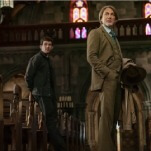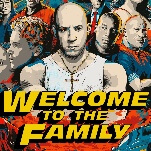We’ve never seen Daniel Holden at home. The first three seasons of Rectify are set in the man’s hometown, and we’ve seen plenty of flashbacks to the place where he was forced to live for nearly 20 years. But a spot where Daniel can feel at ease, that he can call both residence and refuge? That remains tantalizingly out of reach.
At first, “A House Divided” suggests that Daniel may have found a home in Nashville. Introducing the New Canaan Project—an organization devoted to re-acclimating former inmates to the community, introduced by Jon Stern in season three—Ray McKinnon’s script and Patrick Cady’s direction paint a serene, near-silent portrait of Daniel’s surroundings. But the picket fence clashes with the wailing siren and the poorly tended bus shelter, and the apparent structure of a warehouse job is disrupted by a supervisor who tells Daniel he can knock off early for the day.
Only he doesn’t say this to Daniel—he says it to “Dan.” People keep shortening Daniel’s name throughout these first 45 minutes of season four, but he never pushes back against. Only when he’s given the chance to identify himself—in his introduction to Chloe, an artist played by Caitlin FitzGerald—does he get to go by the name he’s chosen, the name his family uses. And with the exception of a voicemail from Janet, that family is completely absent from the season premiere, heightening the sense that Daniel Holden is one more a man without a country.
But we knew about this rootless feeling before. It’s been one of Rectify’s focal points for 22 episodes; the entire third season built up to Daniel’s banishment. “A House Divided”’s achievement is in making the familiar unfamiliar all over again, in a place where the name “Daniel Holden” evokes no boogeymen, where Aden Young’s character can be held up as a shining example of New Canaan’s good works. But as we’re reminded in the scenes that follow, he’s neither monster nor model citizen. As ever, Rectify remains most interested in exploring the gray areas, and with the New Canaan House, it does so in a setting where morality is even more black-and-white than it is in Paulie.
The New Canaan House is a place of strict rules and regulations, but it aims to disabuse its residents of the code of ethics they picked up in prison. Avery (Scott Lawrence) lectures Daniel over breaking curfew (not that the warehouse gave him any choice), but tells the residents of the group home that, in their meetings, there is no right or wrong—“Just honest.” They’re still adjusting, but for Tyrus (Markice Moore), Nate (Charles Halford), Pickle (John Marshall Jones), or the woman Daniel meets while turning in his paystub, there’s a chance that this way of looking at the world will sink in. They could come to know that there is no “inside” or “outside,” that there are things which they cannot change (and have the serenity to accept this), and things that they can (if they summon up the courage to do so).
It’s a one-size-fits-all solution, and Daniel doesn’t slot easily into an “all” category. He’s more like the specialized parts he spends his days retrieving—and if the wrong parts are received, the whole order has to be refilled. Before his housemates’ plea to contribute, before his tearful address to Avery, “A House Divided” establishes the ways Daniel is isolated and isolating himself: During group, he gives a dry rundown of his day, nothing more. Jesse reaches out about the unopened envelope (“Don’t see many dudes getting letters on the outside. Everybody’s texting”), but only gets a terse “Yeah” in response. When the brownout delays the overtime warehouse shift that’s already put Daniel at odds with his co-workers, he opts to wander on his own, skipping dinner to happen upon the arts co-op shared by Chloe and Peyton (Joshua Mikel).
And more often than not, the camera frames Aden Young apart from his co-stars. The blocking in the group scene is especially potent in that regard: Tyrus, Avery, and Pickles are seen in over-the-shoulder shots demonstrating that they’re engaged in a conversation—or at least sharing the same physical space. But multiple times, when the camera turns to Young, he’s dead center, looking one way or another but with no other visual cues that he’s in the same circle as the five other men.
When “A House Divided” cuts to a fuller view of the room, he appears outside the circle, either slightly behind or slightly above it—the silent observer so often implied by Rectify’s eavesdropping camera setups. Daniel tries to return to the same position during the card game in the episode’s final scene, but the guys don’t let him. The piece doesn’t fit, and it won’t be forced to fit—but it can still contribute to the mechanisms that keep the house functioning.
During group, Nate makes the observation that the New Canaan residents didn’t automatically learn how things operated in prison, so they shouldn’t expect to automatically figure out civilian life, either. But when Daniel finally opens up to Avery, he reveals a soul lost between those two worlds. And it’s not as facile as that makes it sound: As he hints in his first visit to Chloe’s studio, Daniel’s sense of reality is entirely askew. He confessed to the rape and murder of Hanna Dean, was convicted, and sentenced to death. Exonerated, he can say he killed Hanna, and he can say he didn’t, but he’ll never know the truth for certain. He is Schrodinger’s inmate, simultaneously guilty and innocent, imprisoned and free.
The scene is a spotlight moment for Aden Young in an episode focused exclusively on Daniel. Throughout the run of the series, he’s only been given a few select moments to articulate the character’s internal turmoil, and he does so expertly here. He gives voice to the loneliness he felt upon losing Kerwin—a loneliness that continues to haunt him. As the monologue goes on, it begins burrowing into philosophical topics, but Young keeps the scene grounded in emotion. The Descartes-twisting punctuation—“If I am dead, then why I am still so goddamn lonely”—stings, but its importance comes a few lines earlier: Death row robbed Daniel of his sense of self. And now he’s in a strange place with strange people who refer to him by a strange name. Dan walks into that room, but Daniel walks out, and he goes directly to a place where he can both practice one of New Canaan’s guiding principles—he’s upfront with Chloe about his prison time—and maybe even find a creative expression for all the feelings he’s been holding in.
In their conversation, Avery encourages Daniel to “lean the other way for a while,” and “A House Divided” draws a direct line from this advice to the scene at the co-op. This is Daniel leaning the other way—from instincts to hide his past, close himself off, retreat from the world. It might not stick, but for the time being, Daniel Holden is making a home for himself by leaning the other way.
Stray observations
- Hi, everyone! After taking the third season off, I’m glad to be back on the Rectify beat. It’s been one of the most rewarding reviewing experiences during my time with The A.V. Club, and I’m grateful to Brandon Nowalk for a) taking the reins while I tussled with True Detective last summer, and b) handing the reins back for this final season.
- The scoring in “A House Divided” is a little heavy-handed at times, particularly when the episode wants to underline Daniel’s discomfort with his new surroundings. But it also gives a larger sense of scale to an otherwise intimate affair, making sure the season premiere still comes across as a part of the larger Rectify saga.
- Caitlin FitzGerald is a welcome addition to the supporting cast, and Chloe seems like she’ll inject a little levity into the Nashville scenes.
- When Daniel accepts his seat at the card table, he mentions playing gin rummy with Amantha—the very same game that Amantha plays with Teddy in the third-season finale.
- Rectify is ambiguous as ever, but one thing’s for certain: Daniel is not a Dan. Even when he chose a pseudonym on his second-season trip to Atlanta, he went with something dignified and unabbreviated: Donald.








































